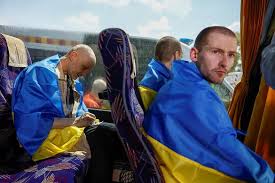
KYIV, Ukraine, June 26, 2024 (BSS/AFP) - Representatives of Russia's and
Ukraine's human rights offices held a meeting for the first time during an
exchange of prisoners of war (POWs) on Tuesday, Kyiv said.
The two countries each released 90 captured soldiers in a deal brokered by
the United Arab Emirates, the latest in more than 50 prisoner exchanges that
have taken place throughout the war.
But it was the first time Russia had agreed to hold a direct meeting
between human rights representatives during the exchange, Ukraine's human
rights commissioner Dmytro Lubinets told AFP in a statement.
"This was another initiative of Ukraine, to which the Russian side agreed
for the first time," he said.
Representatives of both sides recorded the condition of the POWs being
returned to monitor for possible human rights violations while in captivity, he
said.
Russia's human rights commissioner Tatyana Moskalkova also confirmed that a
meeting between representatives of the two sides took place.
She said they had "exchanged information on possible options for the mutual
return of civilians" currently being held.
More than two years after Russia invaded Ukraine, public diplomatic
contacts between the two sides are rare.
Kyiv said the Ukrainian POWs complained of being kept in poor conditions
while in Russian captivity.
Lubinets said the Russian side took note of their complaints and hoped
Moscow would "make every effort to ensure the conditions of detention of
prisoners of war improve."
The United Nations Human Rights Monitoring Mission in Ukraine said
Wednesday it had recorded cases of Ukrainian soldiers being "tortured" while in
Russian captivity.
It said in a report it had interviewed more than 600 freed Ukrainian POWs,
including some who were released in an exchange on 31 May.
"Consistent with previous findings, every single interviewee from this
recent exchange has given accounts of torture, from brutal beatings to
prolonged stress positions, to electric shocks on genitals and to dog attacks,"
it said.
"Many interviewees described feeling constantly hungry in captivity and
being deprived of proper medical care for prolonged periods," it added.